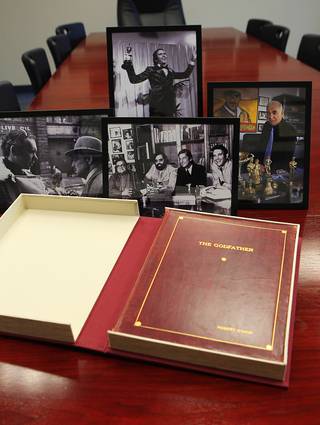When the folks at the cable TV show “Pawn Stars” examined a leather-bound copy of “The Godfather” screenplay, they concluded it was autographed by Al Pacino and offered to buy it from Catholic Charities of Southern Nevada for $500.
Diane Hutton, who works at the charity where the screenplay was found in a carton of discarded books, had taken it to Gold & Silver Pawn where the hit TV show is filmed. She rejected the offer, figuring she could do better.
Indeed.
Because of publicity surrounding the episode, which aired in July and has been rerun, the charity has been swamped with offers to buy the screenplay. Bidding is now up to $4,000 and will conclude at a fundraising event Feb. 9.
Al Pacino fans need not get in line. Turns out the distinctive, cursive signature “Al” wasn’t his, but belongs to Al Ruddy, the producer of the 1972 movie that won three Academy Awards — best picture, best actor (Marlon Brando refused to accept the award) and best adapted screenplay (Mario Puzo and Francis Ford Coppola).
Ruddy had given the 158-page screenplay to Robert Evans, who headed production at Paramount Studios at the time. Ruddy wrote on a blank page, “Bob — It cost me a lot ... but there’s one thing that I got ... ulcers — Thanks — Al.”
Ruddy says he has no idea how the screenplay ended up in a charity drop-off bin, but that he’s delighted that it will help make money for the organization. He’s even throwing in some memorabilia photos of the movie and has taped a video where he thanks the ultimate buyer of the screenplay for buying it.
“I’m very taken with the effectiveness of Catholic Charities and what they’ve accomplished in Nevada,” Ruddy said Wednesday. “Whatever I can do to facilitate helping people in desperate need, I’m more than happy.”
Ruddy learned of the wayward screenplay like everyone else: He was watching “Pawn Stars” on TV when Hutton tested the waters at the shop and a signature authenticator, brought in for the show, said the signature was Pacino’s.
Back home in front of his TV, Ruddy barked, “That’s my signature!”
The signature authenticator, John Reznikoff of Westport, Conn., who buys and sells historic documents and relics, acknowledges his error. Reznikoff was confident that the signature was not forged — the first thing an authenticator determines — because there was no pooled ink or other signs of hesitation that are found in forgeries. And “Al” was written with a particular flair that appears in Pacino signatures.
Turns out that Ruddy writes in a similar fashion, and when Reznikoff realized he was wrong in his assessment, he not only apologized to Catholic Charities but donated $1,000 to the organization.
“Everyone makes mistakes,” he said Wednesday. “The issue is what you do after you make the mistake.”
And in the final analysis, he said, “the charity has benefited from the screenplay, so I’m happy.”
Meanwhile, with every rerun, people keep calling Catholic Charities with offers to buy the screenplay.
“People from all over the country are leaving us their bids,” said Patricia Falvey, vice president of development at Catholic Charities. Bidding — by phone, online and in person, will close at 11:30 a.m. Feb. 9 when the organization holds its Heart of Hope fundraiser.
To preserve the book as it increases in value, Falvey called the special collections office at the UNLV library. The unit’s conservator, Michael Frazier, advised Falvey to handle the screenplay with white gloves, and then crafted a strongbox, called a clamshell, to hold the book.
There is one remaining mystery surrounding the screenplay:
“I got a call from a gentleman with a British accent who said he was Robert Evans’ butler, who said he saw the show and that Mr. Evans wanted the screenplay back,” Falvey said. “I asked him if he could prove it was his, or if I could speak to Mr. Evans.
“He said no, that Mr. Evans was in poor health. He said that the screenplay had been stolen and I asked if I could see a copy of the police report because we would return it if it had been stolen, and he said, ‘Well, we didn’t know it was stolen.’
“The whole thing sounded flaky to me, so I told him that if he wanted it back, he could bid on it,” Falvey said. “I haven’t heard back from him since.”



Join the Discussion:
Check this out for a full explanation of our conversion to the LiveFyre commenting system and instructions on how to sign up for an account.
Full comments policy